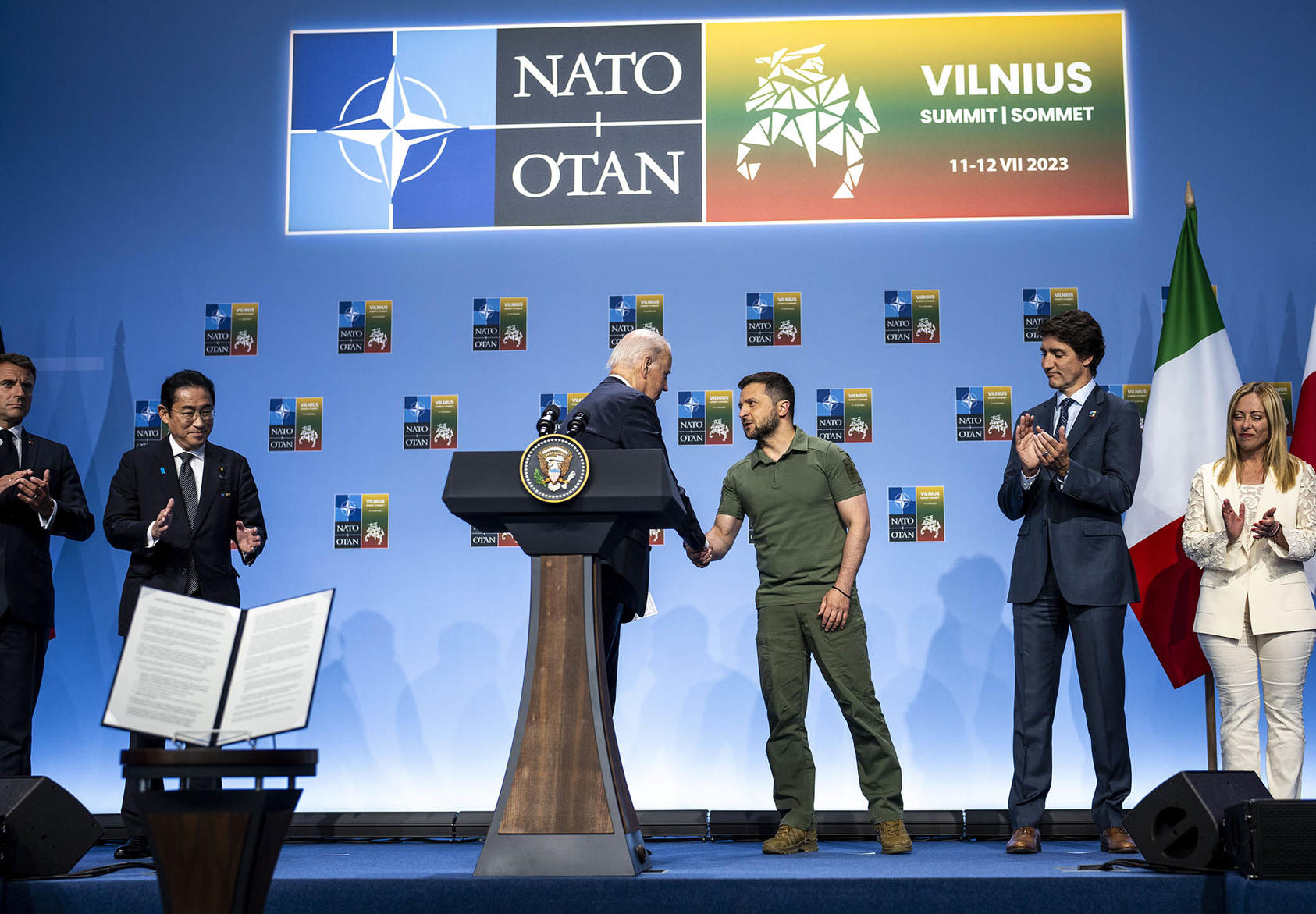The NATO Summit: Three Takeaways for Europe, War and Peace
The conference in Vilnius wrought what was possible: incremental steps for Ukraine and stability.
This week’s NATO summit conference wrought significant advantages for Ukraine in its fight for independence, and on behalf of Europe’s security. Ukraine and most NATO members sought an unconditional invitation for Ukraine to join the NATO alliance following its war with Russia. They achieved part of that goal — a shorter, clearer path to Ukraine’s membership, USIP analysts note. Turkey’s reversal, to support Sweden’s accession to the alliance, strengthens the community backing the Ukrainians’ self-defense. While the summit had no prospect of lightening the burdens of defending Ukraine, Europe and the international rule of law, it accomplished what was achievable in the moment.

USIP analysts Mary Glantz and Don Jensen summarize the key events of the summit.
1. Ukraine now has new commitments of support and a shorter path to NATO membership.
Glantz: Ukraine and several other allies went into the summit hoping for a clear message that Ukraine would be a member when the Russian war was over, with no other conditions. The United States apparently went in hoping that the NATO leaders would emerge with a unified message that would show no divisions.
In the end, the summit succeeded in producing a unified message that “We will be in a position to extend an invitation to Ukraine to join the Alliance when Allies agree and conditions are met.” The phrase “when…conditions are met” was seen by many as a disappointment. While this, indeed, did not go as far as Ukraine and its supporters wanted, the leaders’ communique was unequivocal in its support for Ukraine and its denunciation of Russian aggression. The leaders also agreed that to become an ally, Ukraine could skip the step of proceeding through an arduous process known as a Membership Action Plan. In addition, most participants agreed that the importance of the summit was the acceptance among allies that Ukraine belonged in NATO. It is now a given that Ukraine will be an ally; the only question is when.
In addition to political support for Ukraine, Ukrainian President Volodymyr Zelenskyy left Vilnius with significant new commitments for more weapons from several NATO allies. The Group of Seven industrialized nations also issued a joint declaration committing to long-term security arrangements for Ukraine, including weapons and other military support, to deter any future Russian attack on the country.
Overall, while many were disappointed that the summit did not do more, Ukraine came out of Vilnius with a much clearer, shorter path to NATO, and strong commitments to NATO support for its current and future security.
2. Sweden’s accession to NATO is a welcome step for Europe’s long-term security but offers no change in the war.
Glantz: Turkey’s (and Hungary’s) agreement to allow Sweden’s accession to NATO was a welcome development for the rest of the alliance — and for Stockholm. It sent a clear signal of NATO unity. For Putin, the accession is clearly an annoyance. He has argued for years that eastward expansion of NATO is unacceptable to Moscow, and he used the alliance’s possible expansion to Ukraine as a casus belli in that war.
In practical military terms, however, Sweden’s entry to NATO is not that significant for the Kremlin. Sweden has long exercised jointly with NATO allies, and Russian military planners have already baked in the likelihood that they would face conflict with Sweden as well in the event of war with NATO. In other words, it does not really change Putin’s military calculus.
3. Turkey’s President Erdogan has leaned away from Vladimir Putin following the sudden new signs of Putin’s weakness at home.
Jensen: The summit’s biggest single surprise was Turkey’s President Erdogan reversing his opposition to Sweden’s entry into NATO. That seized headlines of course. But what is less noted is other steps by Erdogan that, cumulatively, signal his stepping back, for now, from accommodating Moscow following the mutiny in Russia by the mercenary Wagner Group. As much as Moscow has tried to conceal and spin that rupture as harmless, it spotlights Putin as a much weaker figure than anyone would have imagined just two months ago. In the light of that, Erdogan has shifted his stance between his imperatives to be a NATO ally and to manage his relations with his giant Russian neighbor. For the moment, at least, he has leaned into greater accommodation to his NATO allies.
The first sign of Turkey’s shift actually came just before the summit. On July 8, Ukrainian President Zelenskyy visited Erdogan, who released to him five Ukrainian commanders who led the fierce resistance to Russia’s invasion last year in the seaport of Mariupol. Russia condemned Erdogan’s decision as a violation of Turkey’s public promise to hold the men in prison, part of a Turkish-brokered prisoner deal last year.
From the outside, Turkey’s reversal of opposition to Sweden’s entry seemed very sudden, but that was partly the effect of Erdogan’s underlying effort — fairly successful, it would appear — to drive the toughest possible bargain with NATO allies. Immediately after Turkey’s green light for Sweden, the U.S. administration said it would allow a sale of F-16 warplanes to Turkey that it had resisted for the past 21 months.
Finally, an interesting issue still unfolding is a tension between Russia and Turkey over sustaining the agreement that Turkey helped broker last year to facilitate Ukrainian grain exports via the Black Sea. While Russia has signaled interest in ending the agreement when it expires next week, Turkey has said it will work to keep the accord in place. Erdogan pressed Putin publicly in recent days to extend the deal.



